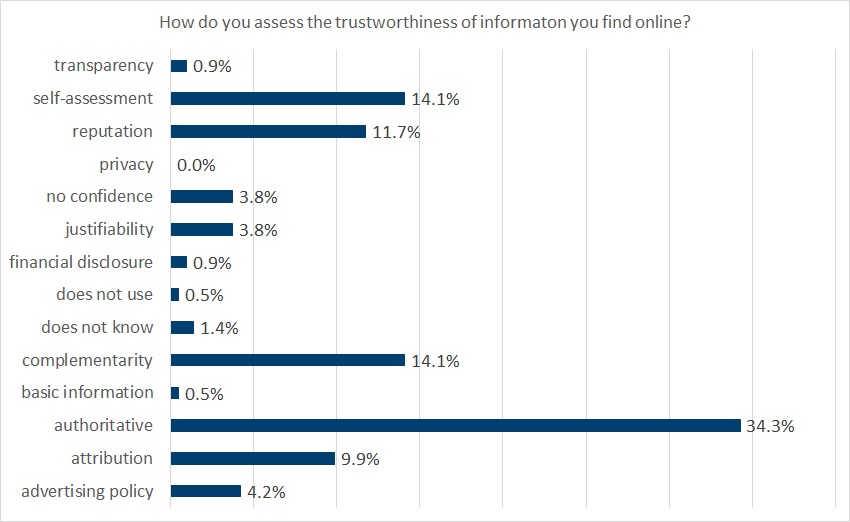How do consumers assess trustworthiness of online health information?
A blog post written by Joao Pedro Guerra Boavida Ferreira, Doctor of Medicine, Instituto Portugues de Oncologia de Lisboa Francisco Gentil (Short-term placement with Southern Adelaide Palliative Services in March and April 2018)
Health information is spread over the internet and the vast diversity of sources of health information available may make it difficult to determine which sources provide evidence-based, accurate information, from those that do not. Indicators of quality can be used to assess the quality of health information online, and can be divided into direct ‘core indicators’ (accuracy, completeness, and currency of information) requiring expert input for each source, and ‘proxy indicators’ (eg. readability, design, disclosures)1. Several approaches to evaluating quality have been developed2. The Health on the Net Foundation has formalised an eight-point code of conduct known as HONcode to assess how web developers are complying with ethical standards in the presentation of health and medical information. Health websites that fulfil all the criteria can receive HONcode certification3. Being aware of the value of such a certification is one mechanism by which consumers can consider the trustworthiness of an online health site. However, consumers may also use their own strategies to assess trustworthiness.
In 2017, CareSearch conducted a survey looking at how members of the community search for and use online health information including information about palliative and end-of-life care. One of the questions in the survey addressed trustworthiness. Two hundred and thirteen free text responses were collected to the question, How do you assess the trustworthiness of information you find online? A coding system was devised to mirror the HONcode criteria. Responses were categorised according to the respective HONcode criterion.
The HONcode criteria are shown below3, and an example of a coded response taken from the survey’s answers are presented in italics following each criterion:
- Authoritative
Indicate the qualifications of the authors
“I go to government-sponsored sites or ones that are research-based”
- Complementarity
Information should support, not replace, the doctor-patient relationship
“I look at who wrote the information; I then ask my GP [general practitioner]”
- Privacy
Respect the privacy and confidentiality of personal data submitted to the site by the visitor
No examples of this criterion were seen in the sample
- Attribution
Cite the source(s) of published information, date medical and health pages
“More research; credibility of site; date of posts; country of origin; research applied to information”
- Justifiability
Site must back up claims relating to benefits and performance
“I look for evidence-based information as I have found in the past a lot of information is just people's opinions”
- Transparency
Accessible presentation, accurate email contact
Padlock in URL bar for security contactability; response time of the site owners”
- Financial disclosure
Identify funding sources
“I investigate to see that it is not sponsored or linked to any pharmaceutical or health-related educational business or corporate venture to ensure there is not a financial bias”
- Advertising policy
Clearly distinguish advertising from editorial content
“1. How much it is connected to sales of goods […]”
In coding the responses, it was found that some answers contained strategies that were not classifiable to any HONcode criterion. A further six criteria were devised as shown below with chosen examples taken from the survey’s answers presented in italics following each criterion:
- Basic information
Search for basic information only, no specific strategy
“I google mainly just to get basic information”
- Does not know
Does not know how to assess the trustworthiness of health information online
“Don’t know”
- Does not use
Does not use the internet to search for health information
“I don't use the internet to gain health information”
- No confidence
No confidence in health information online
“Not confident”
- Reputation
Trustworthiness dependent on the website’s/online health information provider’s reputation
“Only using reputable sites”
- Self-assessment
No specific strategy
“Critical evaluation”
Figure 1 shows how responders to the ‘Community and Consumer Attitudes to Online Health Information’ survey assess the trustworthiness of health information online.

Figure 1
The most common strategy (about one-third (34.3%) of responders) was the ‘authoritative’ strategy’. ‘Self-assessment’ and ‘complementarity’ (14.1%) were the second most important strategies of assessment. About one-tenth (11.7%) of strategies are based in the website’s/online health information provider’s ‘reputation’.
The results show that, rather than focusing on specific details (eg. attribution, justifiability), consumers tend to pay more attention to the information provider’s credibility (eg. authoritative, reputation). So, if health websites want to reach the widest audience they not only need to provide accurate, up-to-date information, but they must also be upfront about their credentials and endeavour to find support from well-recognised public institutions. This appears to be a major marker of the importance for consumers. E-consumers also appear to use strategies that are articulated in the HONCode criteria and therefore building awareness of the HONcode criterion and certification would be valuable.
1Burkell J (2004). Health Information Seals of Approval: What do they Signify? Information, Communication & Society. 7(4), 491-509. doi: 10.1080/1369118042000305610
2Fahy E, Hardikar R, Fox A, Mackay S (2014). Quality of patient health information on the internet: Reviewing a complete and evolving landscape. Australasia Medical Journal. 7(1), 24-28. doi: 10.4066/AMJ.2014.1900
3HONcode (Health On the Net foundation code): https://www.hon.ch/HONcode/ (access 5 April 2018)

Joao Pedro Guerra Boavida Ferreira, MD, Instituto Portugues de Oncologia de Lisboa Francisco Gentil
For some tips on what makes a good website visit CareSearch's 'Is it Trustworthy' webpage.